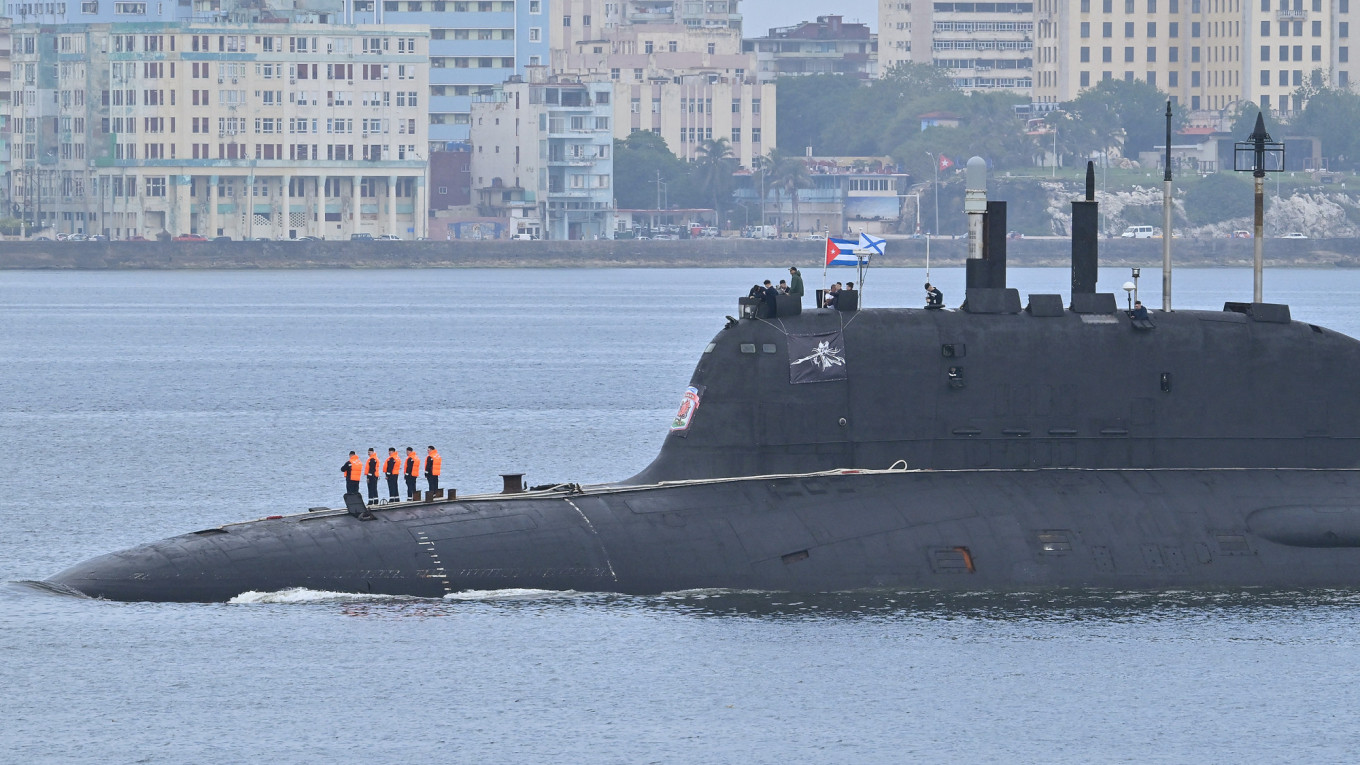Russian Navy Presence in Cuba: Russian Navy Cuba Submarine

Russian navy cuba submarine – The Russian Navy has maintained a presence in Cuba since the Cold War era. The Soviet Union established a naval base in Cuba in the 1960s, and the Russian Navy has continued to operate from the base after the collapse of the Soviet Union.
The Russian Navy’s submarine presence in Cuba has been a source of concern for the United States for decades. In 1962, the Cuban Missile Crisis brought the two superpowers to the brink of nuclear war. Today, the Russian Navy continues to maintain a submarine base in Cuba, which is home to nuclear-powered submarines.
Trevor Bard , a former CIA analyst, believes that the Russian Navy’s submarine presence in Cuba is a threat to the United States. He argues that the submarines could be used to launch a surprise attack on the United States, and that they could also be used to block US access to the Caribbean Sea.
Historical Significance
The Russian Navy’s presence in Cuba has been a source of tension between the United States and Russia. The United States has long viewed the Russian Navy’s presence in Cuba as a threat to its national security. In 1962, the United States imposed a naval blockade on Cuba in response to the Soviet Union’s deployment of nuclear missiles to the island. The Cuban Missile Crisis brought the world to the brink of nuclear war.
The Russian navy’s presence in Cuba has been a source of concern for the United States, especially during the Cold War. In recent years, however, there has been a thaw in relations between the two countries, and the Russian navy’s presence in Cuba has been reduced.
This has coincided with a period of increased interest in world cup qualifiers , which are often seen as a barometer of a country’s footballing strength. The Russian navy’s presence in Cuba has been a topic of discussion in the context of world cup qualifiers, as it could potentially affect the outcome of matches.
Political Implications
The Russian Navy’s presence in Cuba continues to be a political issue. The United States has repeatedly called on Russia to withdraw its forces from Cuba. Russia has refused, arguing that it has the right to maintain a military presence in Cuba under international law.
The recent incident involving a Russian navy submarine near Cuba has raised concerns about the potential for escalation. However, it’s important to remember that international friendlies, such as the upcoming match between the United States and Mexico, can serve as a reminder of the power of diplomacy and cooperation.
While the situation with the submarine remains tense, it’s crucial to maintain open lines of communication and seek peaceful resolutions. As we navigate these challenging times, we must not lose sight of the importance of dialogue and understanding.
Potential Impact on Regional Security
The Russian Navy’s presence in Cuba could have a significant impact on regional security. The Russian Navy could use its base in Cuba to launch attacks on the United States or its allies. The Russian Navy could also use its presence in Cuba to support Russian military operations in other parts of the world.
The recent sighting of a Russian navy submarine off the coast of Cuba has raised concerns among US officials, particularly Nancy Mace , a Republican representative from South Carolina. Mace has been a vocal critic of the Biden administration’s handling of foreign policy, and she has called for a stronger response to Russian aggression.
The submarine’s presence in the region is a reminder of the ongoing tensions between the US and Russia, and it is likely to further strain relations between the two countries.
Submarine Operations in Cuban Waters

The Russian Navy has a long history of deploying submarines to Cuban waters. These submarines have played a variety of roles, including intelligence gathering, surveillance, and anti-submarine warfare. The Russian Navy’s submarine presence in Cuba has been a source of concern for the United States, which views it as a potential threat to its national security.
Types of Submarines Deployed
The Russian Navy has deployed a variety of submarine types to Cuban waters, including:
- Diesel-electric submarines: These submarines are powered by diesel engines and electric batteries. They are relatively slow and have a limited range, but they are also very quiet and difficult to detect.
- Nuclear-powered submarines: These submarines are powered by nuclear reactors. They are much faster and have a longer range than diesel-electric submarines, but they are also more expensive to operate.
- Special-purpose submarines: These submarines are designed for specific missions, such as intelligence gathering or anti-submarine warfare.
Capabilities and Limitations
The Russian Navy’s submarines have a variety of capabilities, including:
- Anti-ship warfare: Russian submarines are equipped with a variety of weapons that can be used to attack ships, including torpedoes, missiles, and mines.
- Anti-submarine warfare: Russian submarines are also equipped with a variety of weapons that can be used to attack other submarines, including torpedoes, missiles, and depth charges.
- Intelligence gathering: Russian submarines can be used to gather intelligence on enemy forces. They can be equipped with a variety of sensors, including sonar, radar, and electronic surveillance equipment.
However, the Russian Navy’s submarines also have a number of limitations. For example, they are relatively slow and have a limited range. They are also vulnerable to attack from anti-submarine warfare forces.
Potential Threats
The Russian Navy’s submarine presence in Cuban waters poses a potential threat to the United States. These submarines could be used to attack U.S. ships or submarines, or to gather intelligence on U.S. forces. They could also be used to support Russian military operations in the region.
Impact on US-Russian Relations

The Russian Navy’s presence in Cuba has a significant impact on US-Russian relations. The US views the presence as a threat to its national security and a violation of the Monroe Doctrine. Russia, on the other hand, sees its presence in Cuba as a way to protect its interests in the region and to counter US influence.
The presence of Russian naval vessels in Cuba has the potential to escalate tensions between the US and Russia. In 2016, a Russian warship was deployed to Cuba for the first time since the Cold War. This deployment led to increased tensions between the two countries and raised concerns about the possibility of a military conflict.
There have been several diplomatic efforts to resolve tensions between the US and Russia over Cuba. In 2017, the US and Russia agreed to establish a “hotline” to communicate directly about military activities in Cuba. This hotline is intended to reduce the risk of misunderstandings and accidents.
, Russian navy cuba submarine
Despite these efforts, tensions between the US and Russia over Cuba remain high. The US continues to view the Russian presence in Cuba as a threat to its national security. Russia, on the other hand, is unlikely to withdraw its forces from Cuba in the near future. As a result, the potential for escalation and conflict between the US and Russia over Cuba remains a serious concern.
The Russian navy’s submarine presence in Cuba during the Cold War was a major source of tension between the two superpowers. The subs were seen as a threat to the United States, and their presence in the Caribbean Sea led to several tense confrontations.
However, the Cuban Missile Crisis was eventually resolved peacefully, and the subs were withdrawn. In recent years, there has been renewed interest in the Russian navy’s activities in Cuba, particularly in light of the ongoing tensions between the US and Russia.
Some experts believe that Russia may be considering deploying submarines to Cuba once again, a move that would likely raise concerns in Washington. Others argue that such a move is unlikely, and that Russia is simply trying to send a message to the US.
Regardless of Russia’s intentions, the potential for a new submarine crisis in the Caribbean Sea is a reminder of the ongoing tensions between the two countries. While the US and Russia have made significant progress in reducing their nuclear arsenals, the threat of nuclear war remains a real possibility.
USA soccer has been a major force in the sport for many years, and its teams have won several World Cups. The US team is currently ranked number one in the world, and it is expected to be a strong contender in the upcoming World Cup in Qatar.